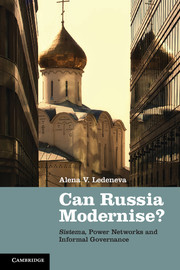Book contents
- Frontmatter
- Contents
- List of figures
- List of tables
- List of boxes
- Acknowledgements
- List of abbreviations and acronyms
- Introduction: modernising sistema
- 1 What is sistema?
- 2 Putin's sistema: svoi on top
- 3 The inner workings of sistema: from blat to otkat
- 4 Sistema's material culture: from vertushka to Vertu
- 5 ‘Telephone justice’ in the global age: from commands to signals
- 6 ‘Werewolves in epaulets’: from doublethink to doubledeed
- 7 From dealership to leadership: sistema and informal governance
- Conclusion
- Appendix 1 Survey questions
- Appendix 2 Interview questions
- Appendix 3 List of interviews
- Glossary
- Bibliography
- Index
- References
Conclusion
Published online by Cambridge University Press: 05 February 2013
- Frontmatter
- Contents
- List of figures
- List of tables
- List of boxes
- Acknowledgements
- List of abbreviations and acronyms
- Introduction: modernising sistema
- 1 What is sistema?
- 2 Putin's sistema: svoi on top
- 3 The inner workings of sistema: from blat to otkat
- 4 Sistema's material culture: from vertushka to Vertu
- 5 ‘Telephone justice’ in the global age: from commands to signals
- 6 ‘Werewolves in epaulets’: from doublethink to doubledeed
- 7 From dealership to leadership: sistema and informal governance
- Conclusion
- Appendix 1 Survey questions
- Appendix 2 Interview questions
- Appendix 3 List of interviews
- Glossary
- Bibliography
- Index
- References
Summary
Memories of sistema
There is an insightful commentary on sistema in Joseph Brodsky's memoirs.
If one had brains, one would certainly try to outsmart the system by devising all kinds of detours, arranging shady deals with one's superiors, piling up lies and pulling the strings of one's [semi-nepotistic] connections. This would become a full-time job. Yet one was constantly aware that the web one had woven was a web of lies, and in spite of the degree of success or your sense of humour, you'd despise yourself. That is the ultimate triumph of the system: whether you beat it or join it, you feel equally guilty. The national belief is – as the proverb has it – that there is no Evil without a grain of Good in it and presumably vice versa. Ambivalence, I think, is the chief characteristic of my nation.
(Brodsky 1986)In one of my interviews, a respondent recalled his first experience of the Soviet sistema:
It actually happened rather early. I was about 12 and went to a sports camp, as one did back then. My friends were fishing near the camp and wanted to cook fish soup on the fire, so I went to the kitchen to ask for a saucepan and a couple of potatoes. I knew a girl in the kitchen and she gave me a saucepan and told me to pick up some potatoes from the cellar. As I was coming out of the cellar with four potatoes in the saucepan, I bumped into the Director of the camp. He decided I was a potato thief at once. Everyone was scared of him and I guess the kitchen girl denied her involvement. I was grounded to ‘think about my behaviour’ but remained fairly confident that I had done nothing wrong. By the evening of that day a man passed by, flipped his ID and introduced himself as a security officer. He threatened to lock me away as a young offender if I didn't confess to the wrongdoing (popugal). I cried through the night and into the next day. Others were instructed not to talk to me, until one morning an elderly trainer came over and spoke to me like a good cop. He said he understood I didn't mean it and I didn't do it, he said the man who threatened me was only some friend of the director; and he said it would be easier for everyone if I simply apologised – then everything would be back to normal.
- Type
- Chapter
- Information
- Can Russia Modernise?Sistema, Power Networks and Informal Governance, pp. 244 - 255Publisher: Cambridge University PressPrint publication year: 2013



